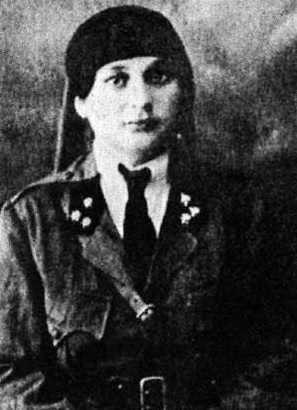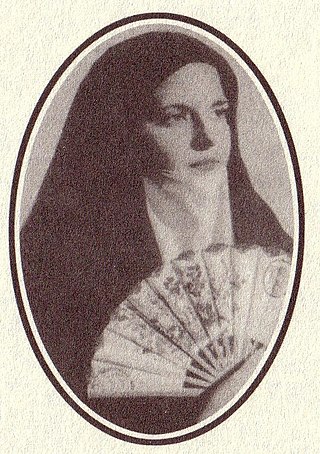
Cairo University is Egypt's premier public university. Its main campus is in Giza, immediately across the Nile from Cairo. It was founded on 21 December 1908; after being housed in various parts of Cairo, its faculties, beginning with the Faculty of Arts, were established on its current main campus in Giza in October 1929.
The Nahda, also referred to as the Arab Awakening or Enlightenment, was a cultural movement that flourished in Arab-populated regions of the Ottoman Empire, notably in Egypt, Lebanon, Syria, and Tunisia, during the second half of the 19th century and the early 20th century.

May Elias Ziadeh was a Lebanese-Palestinian poet, essayist, and translator, who wrote many different works both in Arabic and in French.
Human rights in Lebanon refers to the state of human rights in Lebanon, which were considered to be on par with global standards in 2004. Some believed to be criminals and terrorists are said to be detained without charge for both short and long periods of time. Freedom of speech and of the press are ensured to the citizens by the Lebanese laws which protect the freedom of each citizen. Palestinians living in Lebanon are heavily deprived of basic civil rights. They cannot own homes or land, and are barred from becoming lawyers, engineers and doctors. However, the Lebanese government has reduced the number of restricted jobs and created a national dialogue committee for the issue. During the Arab Spring, Lebanon experienced major protests and sectarian violence, but avoided the large-scale political upheaval seen in many parts of the Arab world.
Assia Dagher was a Lebanese-Egyptian actress and film producer.

Arab cinema or Arabic cinema refers to the film industry of the Arab world which depends for most of its production on the Egyptian cinema.

The roles of women in Lebanon have evolved throughout history. The legal status of women improved over the 20th century, but patriarchal norms and conservative versions of Islamic law still limit women's rights in Lebanon.
The Faeq al-Mir arrest controversy refers to the arrest, imprisonment, and calls for release of Faeq al-Mir, leader of the Syrian People’s Democratic Party, after he telephoned Elias Atallah, a Lebanese politician critical of Syrian policies there. In the call, taped by Syrian Intelligence forces, al-Mir gave condolences to Atallah regarding the assassination of Pierre Gemayel, Lebanon's Minister of Industry. Al-Mir was detained by Syrian security forces at his home in Latakia on December 13, 2006, and charged in March 2007 with "undertaking acts that weaken national sentiment during times of conflict" and "communicating with a foreign country to incite it to initiate aggression against Syria or to provide it with the means to do so." On December 31, 2007, Damascus's First Criminal Court ruled him guilty of "circulating false or exaggerated news which would weaken the morale of the nation" and sentenced him to three years in prison, though the duration was immediately reduced to 18 months. Human rights groups, including Human Rights Watch and Amnesty International, criticized the arrest and demanded al-Mir's unconditional release.
The tradition of women's literary circles in the Arab world dates back to the pre-Islamic period when the eminent literary figure, Al-Khansa, would stand in the 'Ukaz market in Mecca, reciting her poetry and airing her views on the scholarship of others. From this, a culture of literary criticism emerged among Arab women, and under the Umayyad dynasty, Sukaynah Bint Al-Husayn established the first literary salon in her home. The tradition was revived during the late nineteenth century, as a result of sweeping social, political and economic change within the Ottoman Empire and Europe's increasing political and cultural influence in the region. The initial pioneers of the Arab salon were women from wealthy families in Greater Syria and Egypt, who returned influenced by interaction with European women during their time spent studying abroad and frequenting Parisian salons, or studying in schools run by European or American missionaries. The salon evenings, run by women but attended by both men and women, provided a unique opportunity to have discussions about social, political and literary trends of the day. Though the tradition died out somewhat after the Second World War, it has left a lasting legacy on literary culture and women's issues throughout the Arab world. Indeed, more than one hundred years later, the UN Arab Human Development Report echoes what many people in Arab societies were coming to realise at that time: "An Arab Renaissance cannot be accomplished without the rise of women in Arab countries."
Palestinians in Lebanon include the Palestinian refugees who fled to Lebanon during the 1948 Palestine War, their descendants, the Palestinian militias which resided in Lebanon in the 1970s and 1980s, and Palestinian nationals who moved to Lebanon from countries experiencing conflict, such as Syria. There are roughly 3,000 registered Palestinians and their descendants who hold no identification cards, including refugees of the 1967 Naksa. Many Palestinians in Lebanon are refugees and their descendants, who have been barred from naturalisation, retaining stateless refugee status. However, some Palestinians, mostly Christian women, have received Lebanese citizenship, in some cases through marriage with Lebanese nationals.

Afifa Karam was a Lebanese-American journalist, novelist, and translator. A writer for the New York City-based Arabic-language daily newspaper Al-Hoda, Karam authored three original Arabic novels as well as a number of Arabic translations of novels from English and French. She was an advocate for women's rights in the Mahjar, or Arab diaspora, and of Arab Feminism.

Nazik Al Abid known as the "Joan of Arc of the Arabs" was a Syrian women's rights activist, nationalist, and critic of Ottoman and French colonialism in Syria. She was the first woman to earn rank in the Syrian Army for her role in forming the Red Star Society, a precursor to the International Red Cross and Red Crescent Movement, during the battle of Maysalun. She was a revolutionary for national independence and women's right to work and vote in Syria.

Zaynab Fawwaz (1860–1914) was a Lebanese women's rights activist, novelist, playwright, poet and historian of famous women. Her novel "حسن العواقب/Ḥusn al-Awaqib", is considered the first novel in Arabic written by a woman. Her play, "الهوى والوفاء/Al-Haawa wa al-Wafa", is the first play written in Arabic by a woman.
Warda al-Yaziji (1838–1924) was a Lebanese Christian poet who rose to prominence in the early twentieth century, and is considered a pioneer for opening up the field of writing to women.

Esther Moyal was a Lebanese Jewish journalist, writer and women's rights activist. She has been described as a key intellectual in the 20th century Nahda, or Arab Renaissance.
Zahia Kaddoura was a Lebanese academic and a human and women's rights advocate. She served as a dean of the Lebanese University, and was the first woman to do so. Kaddoura was also the first Lebanese woman to earn a PhD from an Egyptian university.
Salma al-Haffar Kuzbari was a Syrian writer and translator. She is best known for her literary criticism and biography on the women's rights activist and writer May Ziadeh, as well as for her writing on Spain's Andalusia region, notably the book The Two Eyes of Seville.
Salima Abi Rashed, was a Lebanese lawyer and journalist, considered the country's first female lawyer. She founded one of Lebanon's earliest women's magazines, Fatat Lobnan, in 1914.
Laure Thabet, was a Lebanese women's rights activist. She was a pioneer figure of feminism in her country.






